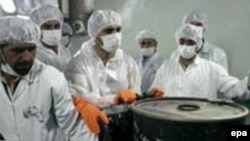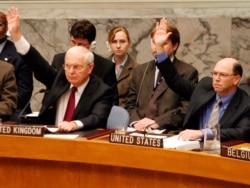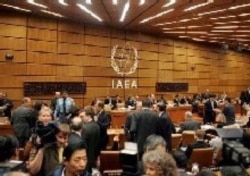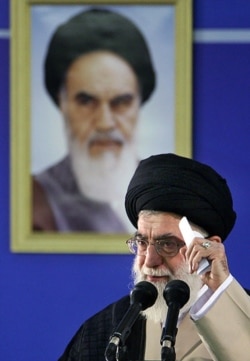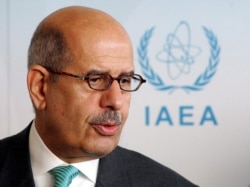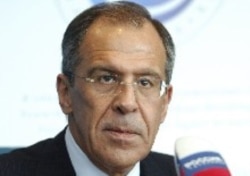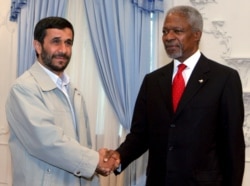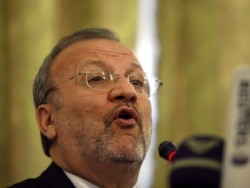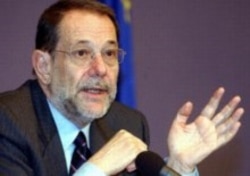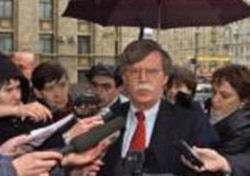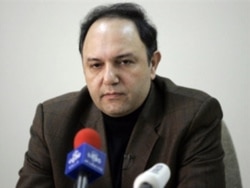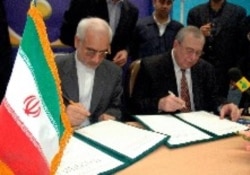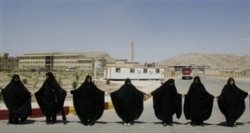23 May 2007 -- The International Atomic Energy Agency (IAEA) says in a new report, issued to coincide with the expiration of a Security Council deadline for Tehran, that Iran continues to defy UN Security Council demands to halt uranium enrichment and has in fact expanded such work. The IAEA adds that the UN nuclear agency's ability to monitor nuclear activities in Iran has declined due to lack of access to sites. IAEA Director-General Muhammad el-Baradei urges constructive efforts on both sides and estimates that Iran could build a nuclear weapon within "three to eight years" -- if it chose that path.
17 May 2007 -- U.S. President George W. Bush says alongside outgoing British Prime Minister Tony Blair that the United States and Britain will seek new UN sanctions against Iran if it continues to resist calls for it to halt sensitive areas of its nuclear program. Bush is speaking the same day that a senior Iranian official says Tehran has expanded work on its nuclear facility at Natanz.
2 May 2007 -- A foreign affairs adviser to Supreme Leader Ayatollah Ali Khamenei tells a conservative daily that Iran is capable of the "mass production" of centrifuges used for enriching uranium.
28 April 2007 -- EU foreign policy chief Javier Solana calls on the United States to open a direct "channel of communication" with Iran on all topics, adding that it remains unclear "how far the U.S. is willing to engage" with Iran.
25-26 April 2007 -- EU foreign policy official Solana and Iranian nuclear negotiator Ali Larijani restart talks aimed at finding a nuclear compromise.
April 19, 2007 -- An IAEA official says in a leaked letter that Iran has assembled roughly 1,300 centrifuges into eight cascades and begun making nuclear fuel in its underground uranium-enrichment plant at Natanz. The Iranian ambassador to the IAEA says that "our enrichment is continuing under the safeguards of the IAEA, the inspectors and cameras are controlling all activities, and the report of how many centrifuge machines and the latest status of the activities in Natanz will be reported by the director-general."
11 April 2007 -- A spokeswoman for the International Atomic Energy Agency (IAEA) predicts that Iran will have the capacity to build its own nuclear bomb in four to six years, leaving time for diplomatic efforts to counter any potential danger.
10 April 2007 -- Foreign Minister Manuchehr Mottaki says Iran will not accept any suspension of its uranium-enrichment activities and urges world powers to accept the "new reality" of the Islamic republic's nuclear program.
9 April 2007 -- Iran says the country's uranium-enrichment program is ready to operate on an "industrial level."
24 March 2007 -- The Security Council unanimously approves a resolution broadening UN sanctions against Iran for its continuing failure to halt uranium enrichment. Iranian officials call the new measures "unnecessary and unjustified." Officials confirm that Iranian President Mahmud Ahmadinejad canceled a New York visit in which he vowed to address the Security Council ahead of the sanctions vote; Tehran blames U.S. delays over visas for Ahmadinejad's entourage.
20 March 2007 -- Russia and Iran reject a report in "The New York Times" of March 19 suggesting that Moscow told Tehran it would withhold fuel for the Bushehr nuclear plant unless Iran complied with UN demands to suspend uranium enrichment.
15 March 2007 -- Diplomats say the five permanent UN Security Council members plus Germany have agreed on a draft resolution imposing new sanctions on Iran for defying demands to suspend uranium enrichment.
12 March 2007 -- The Russian company building Iran's first nuclear power station at Bushehr, Atomstroiexport, announces that the facility's launch will be postponed due to a two-month payment delay preventing the delivery of uranium fuel.
11 February 2007 -- The head of Iran's Atomic Energy Organization, Gholam Reza Aghazadeh, says the Russian supplier for its planned Bushehr nuclear plant has signaled a delay over delinquent payments. He suggests the real problem lies on the Russian side and that he hopes the plant is not being "politicized."
8 March 2007 -- The United Nations' nuclear guardian, the IAEA, votes unanimously to cut almost half its aid programs to Iran as part of the UN sanctions targeting Tehran's nuclear program. The Iranian ambassador to the International Atomic Energy Agency, Ali Asghar Soltanieh, counters that the move will not affect his country's enrichment work.
5 March 2007 -- IAEA Director-General Muhammad el-Baradei says Tehran has not convinced the UN nuclear watchdog of the peaceful nature of Iran's nuclear program and an investigation into that program remains at a "stalemate" until Iran provides full cooperation.
26 February 2007 -- The United States says it is seeking "incremental" steps to pressure Iran to suspend uranium enrichment.
25 February 2007 -- President Ahmadinejad says Iran's nuclear program is unstoppable and, in a show of its growing technical prowess the same day, Iran reportedly fires a rocket into space for the first time.
23 February 2007 -- U.S. Vice President Dick Cheney says Washington will "do everything" it can to deprive Iran of nuclear weapons and has not taken "any options off the table," spurring further speculation that U.S. officials would consider military intervention.
22 February 2007 -- The IAEA issues a report confirming that Iran has failed to halt uranium-enrichment activities, as demanded by the UN Security Council. The report also notes that Iran has expanded the program, installing two cascades with many dozens of centrifuges at Natanz and nearing completion on two more cascades.
21 February 2007 - The UN Security Council's 60-day deadline ends for Iran to halt uranium enrichment. Iranian parliamentary speaker Gholam Ali Hadad Adel warns that a delay by Russia in completing the Bushehr nuclear plant would harm bilateral ties. His comments came after Russian nuclear officials' claim that lagging payments from Tehran could delay start-up of the facility.
17 February 2007 -- Supreme Leader Ayatollah Ali Khamenei says "nuclear energy is the future and destiny" of Iran, and notes that its oil and gas reserves "would not last forever."
11 February 2007 -- President Mahmud Ahmadinejad says Iran wants talks to resolve its nuclear dispute and will cooperate with the IAEA, but Tehran will not suspend uranium enrichment. Iranian officials also say they will allow IAEA cameras at its underground nuclear facility at Natanz. French Foreign Minister Philippe Douste-Blazy calls Ahmadinejad's offer of talks while continuing enrichment "totally unacceptable."
8 February 2007 -- Supreme Leader Ayatollah Ali Khamenei says that while he does not expect anything as "irrational" as an attack on Iran, his country would strike back at U.S. interests around the world if it were attacked. A spokesman for the White House National Security Council dismisses Khamenei's comment as "unprovoked" and says President George W. Bush "has made it clear we have no intention of going to war with Iran." Bush's chief spokesman says flatly, "We are not invading Iran."
1 February 2007 -- The French president's office essentially retracts a recent suggestion by Jacques Chirac that a nuclear-armed Iran would not be "very dangerous," calling such an eventuality unacceptable and describing Iran's nuclear program as "opaque and therefore dangerous for the region."
31 January 2007 -- Iran's embassy in Moscow denies a British newspaper report that North Korea is giving it technical help to prepare an underground nuclear test similar to the one carried out by Pyongyang in October.
28 January 2007 -- After talks with Iranian Foreign Minister Manuchehr Mottaki, visiting Russian security chief Igor Ivanov says "Russia is determined" to finish Bushehr nuclear power plant, in southern Iran, on time.
26 January 2007 -- IAEA chief Muhammad el-Baradei warns that a military strike on Iran's nuclear facilities could have "catastrophic consequences" and would only encourage Iran to develop an atomic bomb. "Are you going to bomb the knowledge?" he asks.
22 January 2007 -- Foreign Minister Manuchehr Mottaki confirms reports that 38 UN nuclear inspectors have been prohibited from entering the country in a list that was reportedly delivered to the IAEA; the next day, Tehran stresses that cooperation with the IAEA continues, despite the ban. The European Union urges all countries to enforce the recently passed UN sanctions against Iran.
12 January 2007 -- Outgoing U.S. intelligence chief John Negroponte tells the U.S. Senate Select Committee on Intelligence that Iran is capable of weathering shocks to its economy, noting record oil revenues and manageable debt.
10 January 2007 -- The United States urges China to reconsider a $16 billion energy deal with Iran on the development of oil and gas fields whose outlines were affirmed in a memorandum of understanding in December 2006.
27 December 2006 -- Iran's parliament passes a bill that obliges the government to "revise its cooperation level" with the UN's nuclear watchdog and, at the same time, continue to pursue the country's civilian nuclear program.
25 December 2006 -- President Ahmadinejad responds to UN Security Council Resolution 1737 by saying the sanctions will have "no impact" on Iran's nuclear program.
23 December 2006 -- The 15-member UN Security Council unanimously adopts a binding resolution that calls on Iran to suspend its uranium-enrichment activities and to comply with its IAEA obligations. Resolution 1737 directs all states to prevent the supply or sale to Iran of any materials that could assist its nuclear or ballistic-missile programs. It also imposes an asset freeze on key companies and individuals named by the UN as contributors to Iran's nuclear and missile programs. Iran rejects the move as an "invalid" and "extralegal act" outside the bounds of the UN's charter.
6 December 2006 -- Russian Defense Minister Sergei Ivanov says that imposing overly tough sanctions on Iran could draw out the nuclear dispute.
5 December 2006 -- Ahead of a major-powers meeting on the Iranian nuclear issue, Iranian President Ahmadinejad warns the international community that "if you continue making efforts to halt the progress of Iran's nuclear program [or] if you take any step against Iran's rights -- either in propaganda or international bodies -- the Iranian nation will consider this a hostile act."
24 November 2006 -- IAEA Director-General Muhammad el-Baradei says Iran has pledged to give international inspectors new access to records and equipment from two nuclear sites, as well as environmental samples, from Lavizan and Natanz.
23 November 2006 -- UN diplomats are quoted as saying the IAEA's board of governors shelved Iran's bid for technical aid for a heavy-water reactor project at Arak over fears it could yield weapons-grade plutonium.
20 November 2006 -- President Mahmud Ahmadinejad reportedly says Tehran wants 60,000 centrifuges to enrich uranium to meet its nuclear-fuel needs within a year. He also is quoted as saying that Israel is currently incapable of launching an effective military attack against Iran's nuclear sites.
17 November 2006 -- Russian Foreign Minister Sergei Lavrov says the IAEA should lead efforts to resolve the standoff over Iran's nuclear program, rather than UN Security Council. He suggests that "it was agreed from the beginning that we would seek through the Security Council the swift resumption of negotiations with Iran, and not the punishment of Iran."
15 November 2006 -- U.S. Ambassador to the UN John Bolton says no progress was made in talks on the Iranian nuclear issue involving himself and envoys from Russia, China, Britain, France, and Germany.
14 November 2006 -- Iranian President Mahmud Ahmadinejad predicts that Iran will celebrate its "full nuclearization" by the end of the year that concludes in March, and suggests his country's right to pursue nuclear technology will soon be acknowledged internationally. Reports also emerge suggesting the IAEA will soon report that Iran continues to enrich uranium, spurn cooperation over its nuclear program, and that UN inspectors are pursuing their discovery of unexplained traces of plutonium and highly enriched uranium at a waste facility in Iran with officials in Tehran.
13 November 2006 -- U.S. President George W. Bush says after talks with visiting Israeli Prime Minister Ehud Olmert that "there has to be a consequence" if Iran proceeds with its uranium-enrichment program in defiance of international pressure.
12 November 2006 -- An Iranian Foreign Ministry spokesman says Tehran is pressing ahead with plans to expand its program to enrich uranium and remains determined to install 3,000 centrifuges by March 2007.
11 November 2006 -- Foreign Minister Sergei Lavrov says Russia wants to restart nuclear talks between Iran and the five permanent UN Security Council members plus Germany.
10-11 November 2006 -- Iranian nuclear negotiator Ali Larijani emerges from talks in Moscow divulging no details but saying Iran is ready for dialogue to resolve any disputes over its nuclear program; he reportedly meets with President Vladimir Putin on the second day of his visit.
8 November 2006 -- Britain, China, France, Russia, the United States, and Germany are reportedly still deadlocked after a meeting at the UN to discuss a European draft resolution to curtail Iran's nuclear program and amendments offered by Moscow and Washington. Russian UN Ambassador Vitaly Churkin says there is still a "considerable gap" separating the parties.
5 November 2006 -- Iranian Foreign Ministry spokesman Mohammad Ali Hosseini says Tehran is ready to consider negotiating with the United States on regional issues, including Iraq, if Washington requests it.
4 November 2006 -- Russia stresses that any punitive measures the UN Security Council agrees to impose on Iran "should have a precise limitation on the period for their being in effect."
3 November 2006 -- Russian Foreign Minister Sergei Lavrov says after a meeting in Brussels that a European draft UN resolution on Iran sanctions "goes far beyond [our] agreements."
1 November 2006 -- Foreign Minister Lavrov says a draft UN resolution authored by France, Germany, and Britain to impose sanctions on Tehran over its nuclear ambitions would isolate Iran and Moscow "cannot support measures that are aimed at isolating Iran from the outside world."
31 October 2006 -- Russian Security Council Secretary Igor Ivanov says his country has no information "that would suggest that Iran is carrying out a nonpeaceful [nuclear] program," adding that "the possibilities for continuing political discussion...have not been exhausted."
30 October 2006 -- Iran's president, Mahmud Ahmadinejad, says Tehran would make an "appropriate and firm" response to UN sanctions, adding that "the Iranian nation is standing strong and it will not retreat even one bit from its nuclear rights."
28 October 2006 -- Mohammad Ghannad, the deputy head of Iran's Atomic Energy Organization, says that Tehran has stepped up its uranium-enrichment work.
26 October 2006 -- Russian Foreign Minister Lavrov criticizes a draft UN resolution providing for a form of sanctions against Iran.
24 October 2006 -- Anonymous diplomatic sources at the UN say major world powers remain split over the details of a draft Security Council resolution to respond to Iran's continuing nuclear work.
21 October 2006 -- Foreign Minister Lavrov says Moscow opposes any attempt to use the Security Council to punish Iran over its nuclear program.
18 October 2006 -- EU foreign ministers express backing for gradual sanctions against Iran's nuclear program.
16 October 2006 -- In his country's first reaction to sanctions targeting North Korea for its apparent nuclear-weapons test on October 9, President Ahmadinejad dismisses the UN Security Council as a tool for "hegemony" and "intimidation."
4 October 2006 -- EU foreign policy chief Solana says four months of intensive talks have brought no agreement on suspension of Iran's sensitive nuclear activities, and he adds that the dialogue cannot continue indefinitely.
3 October 2006 -- U.S. Secretary of State Condoleezza Rice suggests the international community will have no choice but to impose sanctions on Iran if it refuses to suspend its uranium-enrichment efforts.
26 September 2006 -- Russia and Iran agree on a September 2007 launch of Iran's nuclear power plant at Bushehr, with electricity production to begin two months later.
25 September 2006 -- Iranian Foreign Minister Manuchehr Mottaki says nuclear talks with European negotiators are "on track" and a diplomatic solution is possible.
22 September 2006 -- Iranian Vice President Parviz Davudi warns that Iran's armed forces will strike back "like lightning" against any attack on the country and destroy "the enemy."
21 September 2006 -- Iranian President Mahmud Ahmadinejad says nuclear talks with the EU are "on the right path." He adds that he is "at a loss" as to what more Tehran can do to provide guarantees that it is no trying to develop nuclear weapons.
20 September 2006 -- U.S. Undersecretary of State Nicholas Burns says six major world powers have agreed to back further EU talks with Iran, but he hints that Washington will push for sanctions if Tehran continues sensitive nuclear work. Burns says an unspecified deadline has been set for the current EU-Iranian talks to achieve results.
19 September 2006 -- U.S. Secretary of State Condoleezza Rice today urged other permanent members of the UN Security Council not to allow their "credibility to decline" by failing to act against Iran.
17 September 2006 -- German Foreign Minister Frank-Walter Steinmeier proposes the creation of shared, U.N.-monitored uranium-enrichment facilities as an alternative to individual countries acquiring their own enrichment technology.
14 September 2006 -- To "set the record straight," the IAEA protests in a letter to U.S. officials that a recent U.S. report describing Iran's nuclear program as a strategic threat contains "erroneous, misleading, and unsubstantiated information." The IAEA dismisses as untrue a claim that Iran is enriching uranium to weapons-grade levels; Iran is enriching to 3.6 percent, not the 90 percent needed for nuclear weapons.
13 September 2006 -- A spokeswoman for EU foreign-policy chief Javier Solana says a second round of EU-Iranian nuclear talks slated for the following day have been postponed. The same day, UN Secretary-General Kofi Annan suggested that Tehran's position on the nuclear issue might have softened.
11 September 2006 -- Muhammad el-Baradei, the head of the International Atomic Energy Agency (IAEA), says he is "encouraged that there is ongoing dialogue" over Iran's nuclear activities.
9-10 September 2006 -- Two days of "productive" EU-Iranian talks end inconclusively, with a vow to meet again the following week.
September 8, 2006 -- U.S. Undersecretary of State Nicholas Burns says the UN Security Council should begin drafting a resolution in the next week on sanctions over Iran's nuclear program. He notes that there is still no consensus on what type of sanctions might be imposed.
5 September 2006 -- The Iranian parliament's Commission for National Security and Foreign Policy approves the outlines of a bill to suspend entry to Iran of UN inspectors in the event of punitive measures by the UN Security Council.
3 September 2006 -- Visiting UN Secretary-General Kofi Annan says President Ahmadinejad reaffirms that Tehran wants to find a negotiated solution to its nuclear standoff with the world but also rejects any suspension of its uranium-enrichment program prior to talks.
1 September 2006 -- Former Iranian President Mohammad Khatami arrives in the United States ahead of a UN conference and several public appearances that make him the most senior Iranian official to visit the United States outside the strict framework of a UN event in more than two decades.
31 August 2006 -- The IAEA reports to the Security Council that Iran has continued to enrich uranium despite UN calls for it to stop its nuclear activities by August 31, adding that its own investigations have been frustrated by a lack of cooperation from Iran.
29 August 2006 -- President Mahmud Ahmadinejad says he thinks the UN Security Council will not punish Iran, but says his country "will not bow to threats and ultimatums." He says Tehran's response to the recent international deadline presents a "very exceptional opportunity" to resolve the nuclear dispute. Ahmadinejad also proposes a live, televised debate with U.S. President George W. Bush.
27 August 2006 -- President Mahmud Ahmadinejad launches a new phase in Iran's nuclear development with the formal opening of a heavy-water-production plant at Arak. Critics fear the plant will eventually be able to produce weapons-grade plutonium, and the IAEA will later shelve an Iranian request for international technical assistance with the plant. Chief nuclear negotiator Ali Larijani says Iran is determined to produce its own nuclear fuel.
22 August 2006 -- Iran responds to a self-imposed deadline by saying an international proposal to curb its disputed nuclear program has "fundamental and serious ambiguities" but adds that Tehran is ready for "serious talks." Iranian officials essentially ignore the demand by the UN Security Council's permanent members plus Germany that Iran halt uranium enrichment.16 August 2006 -- Iranian Foreign Minister Manuchehr Mottaki says Iran is willing to discuss its uranium-enrichment program, although he says international calls for its suspension are "illogical."
4 August 2006 -- The United States slaps sanctions on seven international arms dealers, including two major Russian companies, for allegedly providing banned technology to Iran.
31 July 2006 --The UN Security Council adopts Resolution 1696, calling for Iran to suspend uranium-enrichment activites by August 31 or face the possibility of economic sanctions.
18 July 2006 -- The unfolding crisis between Israel and Hizballah in Lebanon delays UN consideration of Iran's nuclear program.
16 July 2006 -- Iranian Foreign Ministry spokesman Hamid Reza Assefi says the international incentives package is "an acceptable basis" for further negotiations.
12 July 2006 -- A meeting of foreign ministers of the permanent UN Security Council members plus Germany in Paris decides to refer Iran's nuclear program back to the Security Council for possible sanctions.
11 July 2006 -- The EU announces that it is disappointed with progress in Brussels talks with Iran over the international incentives package.
30 June 2006 -- Iranian Foreign Minister Manuchehr Mottaki says Iran will not respond to the international incentives package before August, despite U.S. and EU pressure for Tehran to answer by July 5.
16 June 2006 -- Iranian President Mahmud Ahmadinejad calls a package of international incentives aimed at persuading Tehran to abandon sensitive nuclear activities "a step forward" and says he has "asked my colleagues to carefully consider it."
15 June 2006-- Russian President Putin says after a meeting with President Ahmadinejad on the sidelines of a Shanghai Cooperation Organization summit that the talks left him with a "very positive impression." Putin says Ahmadinejad says Iran is "positively" assessing the package of nuclear incentives. Putin also says any country has the right to use nuclear technology so long as it "does not arouse concerns of the international community on the [nuclear] nonproliferation issue."
12 June 2006 -- Supreme National Security Council chief and top nuclear negotiator Ali Larijani says of the incentives offer that "this proposal contains some positive points, such as the nuclear reactor for Iran." Larijani's comments come as the IAEA board is launching a meeting at which it will discuss the Iranian nuclear standoff.
9 June 2006 -- Austrian Chancellor Wolfgang Schuessel, who holds the European Union's rotating presidency, says Iran has until the July summit of the Group of Eight leading industrialized countries to respond to an offer of incentives aimed at resolving the crisis over its nuclear program.
8 June 2006 -- A new report by the UN nuclear agency says Iran is continuing to enrich uranium and indicates that nuclear inspectors have made little progress on shedding light on worrying aspects of Tehran's nuclear activities in the past.
6 June 2006 -- EU High Representative for Common Foreign and Security Policy Javier Solana meets in Tehran with senior Iranian government officials and presents them with fresh proposals aimed at persuading Iran to abandon its uranium-enrichment program. The proposals have been agreed on by the five permanent members of the UN Security Council -- Britain, China, France, Russia, and the United States -- plus Germany.
15 May 2006 -- The EU says it is ready to offer Iran sophisticated civilian nuclear technology as part of an "exceptional" new package of trade and technical incentives designed to halt Tehran's suspected military nuclear program. EU High Representative for the Foreign and Security Policy Javier Solana says it is "fundamental" that Iran cease its enrichment activities.
17 May 2006 -- President Mahmud Ahmadinejad says in a televised speech that Tehran will reject a European offer of incentives to give up uranium enrichment, saying acceptance of the proposal would be tantamount to swapping nuts and chocolate for gold.
28 April 2006 -- The IAEA sends its report to the UN Security Council faulting Iran for failing to meet demands to suspend uranium enrichment and improve cooperation with nuclear inspectors. The report marks the end of the Security Council's 30-day deadline for demonstrating that its nuclear activities are only for civilian purposes. U.S. President Bush expresses a desire to find a peaceful resolution to the crisis.
27 April 2006 -- U.S. Secretary of State Condoleezza Rice says on the sidelines of a NATO meeting that the UN Security Council "has to act" in order to remain credible if Iran ignores the deadline for halting uranium enrichment. Iranian President Ahmadinejad says Iran will not comply.
25 April 2006 -- Top nuclear negotiator Ali Larijani says Iran will cut ties with the IAEA if the UN Security Council imposes sanctions over Iran's nuclear program.
24 April 2006 -- Iranian President Ahmadinejad says Iran's nuclear activities are transparent and he does not think pursuing uranium enrichment will lead to international sanctions.
23 April 2006 -- Foreign Ministry spokesman Hamid Reza Assefi says Iran's uranium-enrichment and nuclear-research activities are "irreversible."
19 April 2006 -- U.S. Secretary of State Rice says Washington is prepared to use political, economic, and other measures to dissuade Iran from developing a nuclear weapon, adding that it has "diplomatic tools" at its disposal.
12 April 2006 -- IAEA head Muhammad el-Baradei visits Iran to discuss the country's nuclear program with senior Iranian officials but few details emerge. El-Baradei says he cannot confirm Iranian claims that its scientists have enriched uranium to fuel power stations.
11 April 2006 -- Iranian President Ahmadinejad announces, using Islamic rhetoric in a special ceremony seemingly designed to attract popular support, that Iran has completed the nuclear-fuel cycle. The achievement places Iran among the "nuclear countries of the world."
2 April 2006 -- Ali Asghar Soltaniyeh, Iran's ambassador to the IAEA, claims that the more the Security Council is involved, the worse the situation will become.
30 March 2006 -- The five permanent UN Security Council members -- the United States, Britain, France, China, and Russia -- and Germany warn Iran that it must heed the UN statement insisting that it stop its nuclear work or face isolation. Iranian Foreign Minister Manuchehr Mottaki dismisses the warning; other officials will also reject the Security Council warning. IAEA Director-General Muhammad el-Baradei urges Iran to be more forthcoming but also says he thinks sanctions at this time would be unwise.
29 March 2006 -- UN Security Council unanimously adopts statement calling on Tehran to halt its nuclear work.
28 March 2006 -- Russian Defense Minister Sergei Ivanov demands that Tehran say "unambiguously" whether it will accept or reject Russia's offer to enrich uranium to supply an Iranian nuclear program. Reports emerge that the Iranian Embassy in Moscow has proposed the establishment -- with the involvement of other countries -- of a nuclear-fuel production center in Iran.
25 March 2006 -- Syrian First Vice President Faruq al-Shara and Iranian Foreign Minister Manuchehr Mottaki decry Israel's nuclear program as a threat to regional peace.
21 March 2006 -- Iranian Supreme Leader Ayatollah Ali Khamenei says "there is no problem with" direct talks rumored to have been planned between Iran and the United States over the situation in Iraq, as long as those discussions lead Washington to understand Tehran's position. Iranian sources have been quoted as insisting the talks must be limited to the topic of Iraq.
20 March 2006 -- U.S. President Bush says he hopes "to solve this [nuclear] issue diplomatically" with a "united message" from the five permanent Security Council members but adds that Iranian officials' threats against "our strong ally, Israel," are "a threat to world peace." Bush adds that "we will use military might to protect our ally, Israel."
16 March 2006 -- British Prime Minister Tony Blair insists the international community "cannot walk away" from the Iranian nuclear issue and says there was no point turning to the UN "unless something is going to follow as a result of that."
14 March 2006 -- U.S. Ambassador to the UN John Bolton says informal discussions on Iran's nuclear program now include all 15 members of the Security Council and adds that the draft of a possible resolution has been distributed. The same day, U.S. President Bush announces to Congress that he has extended bilateral economic sanctions against Iran by another year. Bush says Iranian government policies and actions pose a continuing threat to the U.S. economy, foreign-policy goals, and national security.
12 March 2006 -- Tehran says a Russian proposal to move Iran's enrichment program to Russia is "off" the agenda and that Iran will not consider any proposal that does not guarantee the country's "right to nuclear research."
8 March 2006 -- IAEA head Muhammad el-Baradei says at the end of a three-day meeting that the agency will forward his report -- which accuses Iran of withholding information, possessing plans linked to nuclear weapons and refusing to freeze uranium enrichment -- to the UN Security Council. El-Baradei urges Iran to "be transparent" and "take confidence-building measures." Iranian President Mahmud Ahmadinejad vows in a televised speech that "Iran will not give in to any political pressure, [will] make no compromise, and will go to the end of the line."
7 March 2006 -- Undersecretary of State Nicholas Burns says Tehran has "crossed the international red line" with its activities to enrich uranium, adding that unless Iran suspends all nuclear activities, the Security Council must get involved.
3 March 2006 -- European talks with Iranian officialsfailto provide a nuclear compromise ahead of the IAEA's March 6-8 meeting.
2 March 2006 -- Reports say Russian-Iranian talks in Moscow fail to produce a "decisive breakthrough" on the basis of a Russian proposal to enrich uranium for Iran. Iranian nuclear negotiator Ali Larijani pledges that his country will not stop its enrichment activities.
26 February 2006 -- The head of Iran's Atomic Energy Organization, Gholam-Reza Aqazadeh, says Iran and Russia have reached basic agreement on a Russian proposal to host Iran's uranium-enrichment program.
14 February 2006 -- Ten days after the IAEA voted to report it to the UN Security Council over its nuclear activities, Iran confirms that it has resumed work on uranium enrichment.
5 February 2006 -- Foreign Minister Manuchehr Mottaki announces the end of Iran's voluntary cooperation with the IAEA.
4 February 2006 -- IAEA governing board votes overwhelmingly to report Iran to the UN Security Council over its nuclear activities.
30 January 2006 -- Foreign ministers of the five permanent members of the United Nations Security Council (China, France, Russia, the United Kingdom, and the United States), plus Germany, concur that Iran should be reported to the council for its nuclear activities, but action should be delayed until after the March meeting of the IAEA governing board. Tehran counters with a threat to end all cooperation with the IAEA and adherence to international accords, as called for by an earlier parliamentary decision.
24 January 2006 -- Supreme National Security Council Secretary Ali Larijani visits Moscow to discuss a December proposal that nuclear fuel enriched in Russia will be shipped to Iran for use, then returned to Russia for storage. Larijani indicated a lack of enthusiasm on 27 January, telling reporters at Tehran's Mehrabad Airport that Moscow's idea does not conform fully with Tehran's needs. He said the proposal should be revised in future discussions. The next round of Iran-Russia talks is scheduled for 16 February.
11 January 2006 -- Leaders from the United States, Russia, and EU countries roundly condemn Iran for its resumption of nuclear-fuel activities. The leaders renew calls for referring the dispute to the UN Security Council.
10 January 2006 -- Iran resumes nuclear research, triggering Western condemnation. Mohammad Saidi, a deputy head of Iran's Atomic Energy Organization, says that Iran agreed with the IAEA on 9 January for IAEA inspectors in Iran to "reopen those places on which we agreed." Resumed activities, he said, are merely in "research, and nothing more. We distinguish between fuel-related research and the production of fuel." On the same day, IAEA Director-General Muhammad el-Baradei informs the IAEA governing board that Iran intends to begin "small-scale" uranium enrichment at its Natanz facility.
3 January 2006 -- Iranian Atomic Energy Organization deputy head Mohammad Saidi told state television that Tehran will resume its nuclear-fuel research. The Iranian government confirmed the report on 9 January.
25 December 2005 -- Tehran formally rejects an offer from Moscow to enrich uranium for its nuclear program in Russia. Iranian officials insist upon Iran's right to enrich uranium on its own soil.
24 November 2005 -- A meeting of the IAEA Board of Governors postpones any action on Iran's nuclear program. The move is aimed at reopening negotiations on a Russian proposal for a compromise that would allow Iran to enrich uranium, but only in Russia and under strict controls.
15 October 2005 -- U.S. Secretary of State Condoleezza Rice holds talks in Moscow with Russian Foreign Minister Sergei Lavrov. The two officials disagree over Iran's nuclear program, with Lavrov maintaining the Iran has the right to develop nuclear energy in accordance with the Non-Proliferation Treaty.
12 October 2005 -- The EU issues a statement calling on Iran to continue negotiations with the EU-3 and to improve its human-rights record.
7 October 2005 -- IAEA head Muhammad el-Baradei and the International Atomic Energy Agency are jointly awarded the Nobel Peace Prize, in part for their work in mediating the conflict over Iran's nuclear program.
28 September 2005 -- Iran's parliament votes to expedite a bill that would end voluntary IAEA inspections of Iran's nuclear facilities.
25 September 2005 -- Tehran rejects the IAEA report and Iranian Foreign Minister Manuchehr Mottaki says his country remains committed to the Non-Proliferation Treaty.
24 September 2005 -- The IAEA governing board adopts a resolution that says the nuclear watchdog, "after two and a half years of intensive inspections," remains unclear on "some important outstanding issues." "Iran's full transparency is indispensable and overdue," it continues, adding that the agency questions Iran's motives for not declaring certain factors and "pursuing a policy of containment." The resolution does not refer Iran to the UN Security Council, but it does hint at this possibility by noting that some of the outstanding questions are "within the competence of the Security Council. The resolution was approved by a vote of 22 in favor, 1 against (Venezuela), and 12 abstentions. (See also, "Iranian Government Reacts To IAEA Nuclear Resolution.")
17 September 2005 -- President Mahmud Ahmadinejad announces the Iranian position on the nuclear issue at the UN General Assembly. "Peaceful use of nuclear energy without possession of nuclear fuel cycle is an empty proposition," he said. He expressed concern about the creation of a nuclear "apartheid," and he calls for a nuclear-weapons-free Middle East. "In accordance with our religious principles, pursuit of nuclear weapons is prohibited," Ahmadinejad said. As a confidence-building measure, Ahmadinejad said, Iran is willing to partner with public and private groups in its uranium-enrichment program. He added that Iran will continue to cooperate with the International Atomic Energy Agency. However, he dismissed promises that other countries will be the source of fuel for the Iranian nuclear program.
2 September 2005 -- Members of the IAEA Board of Governors receive a report on Iran's nuclear activities. It notes that Tehran has been less than forthcoming about some of its activities and has been reluctant to provide access to some sites. "In view of the fact that the agency is not in a position to clarify some important outstanding issues after two and a half years of intensive inspection and investigation, Iran's full transparency is indispensable and overdue," the report states. "Given Iran's past concealment efforts over many years...transparency measures should extend beyond the formal requirements...and should include access to individuals, documentation on procurement, and dual-use equipment."
August 2005 -- Iran rejects the EU proposal, which includes commercial and political cooperation in exchange for Iran's forsaking efforts to develop nuclear fuel. (See also, "IAEA Draft Resolution Expresses 'Serious Concern' Over Iran's Nuclear Activities.") The European proposal included an offer to help build a light-water reactor and then provide fuel for it. (Fuel for a light-water reactor is cannot be used for weapons.)
July 2005 -- President Khatami says on 19 July that Iran will not forsake the right to produce nuclear fuel and the enrichment suspension will not be permanent. He says on 27 July that activities at the Isfahan UCF could resume in days, depending on the concessions proposed at an Iran-EU meeting. "The system has already made its decision to resume Isfahan's activities," he said.
May 2005 -- Iranian officials repeat that activities at Isfahan UCF will resume "soon," but then Tehran agrees to wait for two months after Iranian and EU officials meet in Geneva.
April 2005 -- Supreme National Security Council Secretary Hojatoleslam Hassan Rohani said on 30 April -- after the previous day's negotiations in London with British, French, and German representatives failed to yield substantive results -- Tehran is considering resumption of activities at the Isfahan uranium conversion facility (UCF).
February 2005 -- Iran and Russia sign an agreement on the return of spent nuclear fuel to Russia for reprocessing and storage. This measure is intended to eliminate the possibility that the materials will be used for making nuclear weapons. Fuel delivery will take place six months before the facility's completion, which should occur at the end of 2006.
January 2005 -- IAEA inspectors visit the Parchin military site, which is southwest of Tehran, to investigate allegations that the military tested conventional explosives that can be used to detonate nuclear weapons there.
December 2004 -- Talks between Iran and the EU-3 over political and economic concessions, in exchange for Iran making its enrichment suspension permanent, are scheduled to begin on 13 December (see "How Close Is Iran To The Bomb?").
November 2004 -- Iran holds talks in Paris with the EU-3. On 14 November, Iran signs an agreement to suspend uranium enrichment. The Europeans offer a series of political and economic concessions in exchange. But at an IAEA board of governors meeting from 25-29 November -- which was set to pass a resolution endorsing the deal and agreeing to monitor it -- Iran insists on an exemption for 20 centrifuges for research purposes. Iran eventually backs down, but demands -- and wins -- key changes softening the resolution in exchange. Most importantly, the resolution describes the enrichment freeze as a voluntary, rather than the legally binding commitment as both the United States and the EU sought. (See also, "The Iranian Nuclear Imbroglio.")
October 2004 -- The EU-3 again calls for Iran to suspend all uranium-enrichment activities to avoid its case being brought before the Security Council. The Europeans offer economic and political incentives in exchange. The Iranian parliament passes a bill approving the resumption of enrichment activities.
September 2004 -- An IAEA report calls Iran's claims about its nuclear program "plausible," but voices concern over Iran's decision to resume large-scale production of the feed material for enriching uranium. Claiming enrichment is a "sovereign right," Iran refuses to accept an unlimited suspension and says it will not stop manufacturing centrifuges. The IAEA gives Iran a 25 November deadline to reveal all its nuclear activities. Tehran later announces that it has resumed large-scale conversion of uranium yellowcake ore, a step toward uranium enrichment.
July 2004 -- Iran says it has resumed production of parts for centrifuges that are used for enriching uranium, but insists that it has not resumed its enrichment activities. The announcement appears to put the enrichment-freeze deal worked out between Iran, the EU-3, and the IAEA in jeopardy.
June 2004 -- IAEA says that inspectors found new traces of enriched uranium that exceeded the levels necessary for civilian energy production.
May 2004 -- Iran submits to the IAEA a 1,000-page report on its nuclear activities.
February 2004 -- Abdul Qadeer Khan, the founder of Pakistan's nuclear program, says that he had provided atomic secrets to Iran, Libya, and North Korea since the late 1980s. IAEA inspectors notice similarities in designs and components for the advanced P-2 centrifuge, adding to suspicions that Khan supplied both North Korea and Iran with same nuclear know-how.
November 2003 -- An IAEA report states that at the moment there is no conclusive proof that Iran is developing nuclear weapons. The United States, seeking to have the matter sent to the UN Security Council, dismisses the conclusion. The IAEA's 35-member board of governors passes a resolution sternly rebuking Iran for covering up 18 years of atomic experiments, but does not send the matter to the Security Council.
October 2003 -- The foreign ministers of France, Germany, and Great Britain travel to Tehran and persuade Iran to agree to stop enriching uranium and to sign the Additional Protocol to the NPT. The EU-3 also dangle economic concessions if Tehran cooperates fully with the IAEA. Iran turns over a declaration to the IAEA admitting to 18 years of covert atomic experiments, including the unreported uranium enrichment, although it continues to deny this was for a weapons program.
September 2003 -- The United States says Iran is in noncompliance with the NPT and calls for a referral to the UN Security Council, which could impose sanctions. But Washington agrees to support a proposal from Great Britain, France, and Germany (who were negotiating on behalf of the European Union and became known as the "EU-3") to give the Tehran until the end of October to fully disclose nuclear activities and allow for a stricter inspection regime.
July 2003 -- IAEA begins a fresh round of inspections in Iran.
June 2003 -- In a report, el-Baradei says inspections have demonstrated that "Iran failed to report certain nuclear materials and activities" and urges Tehran to cooperate with the agency. The report does not declare Iran in breach of the Nuclear Nonproliferation Treaty (NPT). The IAEA requests that Iran sign the Additional Protocol to the NPT and allow unannounced inspections of its nuclear sites.
February 2003 -- International Atomic Energy Agency (IAEA) Director-General Muhammad el-Baradei visits Iran to verify Tehran's claims that its nuclear program is peaceful. IAEA inspectors later find traces of highly enriched uranium at Natanz and other sites.
August 2002 -- An Iranian exile opposition group, the National Council of Resistance of Iran, accuses Tehran of hiding a uranium-enrichment facility at Natanz and a heavy-water plant at Arak.
(compiled by RFE/RL)
Iran's Nuclear Program

THE COMPLETE PICTURE: RFE/RL's complete coverage of controversy surrounding Iran's nuclear program.




